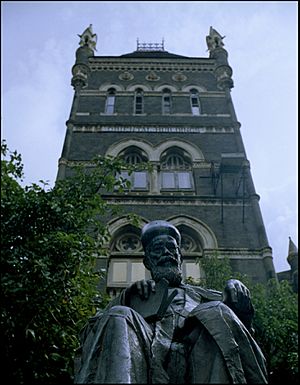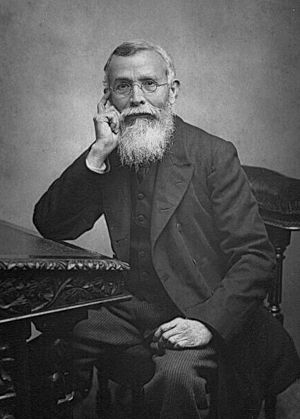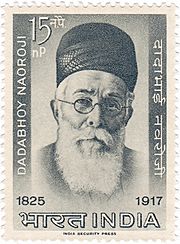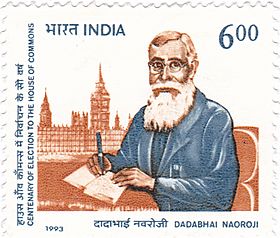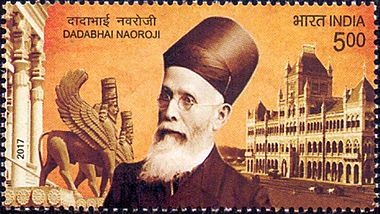Dadabhai Naoroji facts for kids
Quick facts for kids
Dadabhai Naoroji
|
|
|---|---|
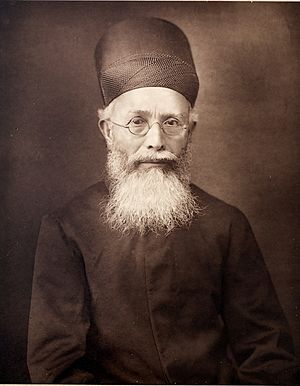
Dadabhai Naoroji, c. 1889
|
|
| Member of Parliament (UK) for Finsbury Central |
|
| In office 1892–1895 |
|
| Preceded by | Frederick Thomas Penton |
| Succeeded by | William Frederick Barton Massey-Mainwaring |
| Majority | 5 |
| 2nd, 9th, and 22nd President of Indian National Congress | |
| In office 1886–1887 |
|
| Preceded by | Womesh Chunder Bonnerjee |
| Succeeded by | Badruddin Tyabji |
| In office 1893–1894 |
|
| Preceded by | Womesh Chunder Bonnerjee |
| Succeeded by | Alfred Webb |
| In office 1906–1907 |
|
| Preceded by | Gopal Krishna Gokhale |
| Succeeded by | Rashbihari Ghosh |
| Personal details | |
| Born |
Dadabhai Naoroji Dordi
4 September 1825 Navsari, Bombay Presidency, British India |
| Died | 30 June 1917 (aged 91) Bombay, Bombay Presidency, British India |
| Nationality | British Indian subject |
| Political party | Liberal |
| Other political affiliations |
Co-founder of Indian National Congress |
| Spouse | Gulbaai |
| Alma mater | University of Mumbai |
| Occupation |
|
| Signature | |
Dadabhai Naoroji (born September 4, 1825 – died June 30, 1917) was an important Indian leader. People called him the "Grand Old Man of India" and the "Unofficial Ambassador of India". He was a politician, a businessman, a scholar, and a writer.
Naoroji was the President of the Indian National Congress three times. He served in 1886-1887, 1893-1894, and 1906-1907. He also became a Member of Parliament (MP) in the British Parliament. He represented Finsbury Central from 1892 to 1895. He was the first person of Indian descent to be a British MP.
His famous book, Poverty and Un-British Rule in India, talked about his idea of "wealth drain." This meant money was unfairly taken from India and sent to Britain. In 2014, new awards for UK-India relations were named after him. India Post has also honored him on postage stamps.
Contents
Who Was Dadabhai Naoroji?
Early Life and Education
Dadabhai Naoroji was born in Navsari, India. He came from a Parsi Zoroastrian family. He studied at the Elphinstone Institute School. Later, he became a professor of Mathematics and Natural Philosophy. This made him the first Indian to hold such a position at Elphinstone College in Bombay.
Starting a Career
In 1855, Naoroji moved to London. He became a partner in Cama & Co. This was the first Indian company to open in Britain. He later started his own cotton trading company.
He also worked to improve his religion. In 1851, he founded the Rahnumai Mazdayasan Sabha. This group aimed to bring back the original ideas of the Zoroastrian religion. He also started a Gujarati newspaper called Rast Goftar. It helped explain Zoroastrian beliefs and promoted social changes.
Working for India in Britain
Naoroji wanted to help India from Britain. In 1865, he started the London Indian Society. This group discussed Indian politics, society, and literature. In 1867, he helped create the East India Association. Its goal was to share India's views with the British public. This group became very important in influencing the British Parliament.
Becoming a Politician
In 1874, Naoroji became the Prime Minister of Baroda. He also served on the Legislative Council of Bombay. He helped found the Indian National Congress. This was a major political party in India. He was elected its President in 1886.
Naoroji moved back to Britain and continued his political work. He was elected as a Member of Parliament in 1892. He was the first British Indian MP. He worked hard to improve conditions in India. He spoke about Irish Home Rule and the struggles of the Indian people.
In 1906, he was again elected President of the Indian National Congress. He was known for being a moderate leader. This meant he preferred peaceful changes. His book, Poverty and Un-British Rule in India, greatly influenced Mahatma Gandhi.
The Drain Theory: How Wealth Left India
What Was the Drain Theory?
Dadabhai Naoroji's most famous idea was the "drain of wealth" theory. He believed that Britain was taking money and resources from India. This made India poorer. He studied India's economy to show how this was happening.
Factors of the Drain
Naoroji pointed out six main reasons for this "drain":
- India was ruled by a foreign government (Britain).
- India did not attract new people who brought money and skills.
- India had to pay for Britain's government workers and army in India.
- India also paid for Britain's empire-building outside its borders.
- Free trade allowed foreigners to take high-paying jobs. Indians, even if qualified, often missed out.
- Many foreign workers earned money in India but spent it outside the country. They also took their savings with them when they left.
Naoroji's book estimated that Britain took 200-300 million pounds from India. This money was not put back into India's economy.
Why Was This a Problem?
Naoroji believed some payment to Britain was fair for services like railways. However, he argued that the money earned from these services did not stay in India. For example, the railways made money, but the profits went to Britain. India was paying for things that did not directly benefit its own people.
British workers in India often earned high wages. They were allowed to send a lot of this money back to Britain. Also, the East India Company bought Indian goods using money taken from India. Then, they exported these goods to Britain. This showed how free trade could be used to exploit India.
Naoroji's Views and Legacy
Fighting for India's Future
When Naoroji became an MP, his first speech was about India's situation. He argued that Indians should be treated as equal British subjects, not as slaves. He believed India should control its own institutions. This would allow money to stay in India.
He explained that if India's economy improved, it could pay taxes to Britain more easily. He also suggested giving more job opportunities to qualified Indians. This would keep money circulating within India.
Naoroji questioned why Britain would not allow French people to hold all high-ranking jobs in Britain. He compared this to how Indians were treated in their own country. He also reminded Britain that they had once opposed wealth being drained from England to the papacy.
His work led to the Royal Commission on Indian Expenditure in 1896. This group looked into India's financial burdens. Naoroji was a member of this commission.
A Lasting Impact
Dadabhai Naoroji is seen as a very important figure in India's fight for independence. He believed that foreign rule was not good for India. He thought India should become independent or at least govern itself.
He is often called the "Grand Old Man of Indian Nationalism." Mahatma Gandhi once wrote to him, saying, "The Indians look up to you as children to the father."
Naoroji once said that the "deplorable drain" of wealth from India caused not only money loss but also a "moral loss." He felt that Europeans took India's wealth and left. He worried that educated Indians had no place in their own country. He believed this could lead to "despotism and destruction."
There are plaques and roads named after him in London, Mumbai, Karachi, and Delhi. His granddaughters, Perin and Khurshedben, also joined the Indian independence movement.
Personal Life and Death
Dadabhai Naoroji married Gulbai when he was 11 years old. He passed away in Bombay on June 30, 1917, at the age of 91.
Works
- Started the Rast Goftar Anglo-Gujarati Newspaper in 1854.
- The manners and customs of the Parsees (Bombay, 1864)
- The European and Asiatic races (London, 1866)
- Admission of educated natives into the Indian Civil Service (London, 1868)
- The wants and means of India (London, 1876)
- Condition of India (Madras, 1882)
- Poverty of India (Bombay, 1876)
- Essays, Speeches, Addresses and Writings of the Honourable Dadabhai Naoroji (Bombay, 1887)
- Lord Salisbury's Blackman (Lucknow, 1889)
- The Parsee Religion (University of London, 1861)
- Poverty and Un-British Rule in India (1902)
Commemorative Postage Stamps
India Post has honored Dadabhai Naoroji on several stamps:
See also
- Electoral firsts in the United Kingdom
 In Spanish: Dadabhai Naoroji para niños
In Spanish: Dadabhai Naoroji para niños
 | William M. Jackson |
 | Juan E. Gilbert |
 | Neil deGrasse Tyson |


